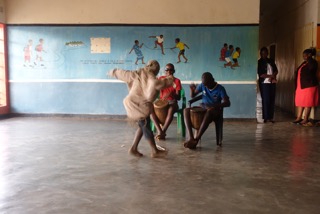Maxwell Matewere, a colleague and Director of the organisation Eye of the Child has just published the book "Betrayal of Trust" in which he describes aspects of sexual abuse of children in Malawi. He describes some horrific cases that have been brought to the attention of his organisation, and that subsequently have been referred to the justice system through the courts. Those who should be the protectors of children are most often the perpetrators. Fathers, step-fathers, half-brothers, step-mothers... abuse children as young as three-four years. Courts are hearing heart-braking stories of acts that should never have happened. Children are quite resilient, but many young girls and women go through life with deep emotional and physical scars!
Why is this happening? Maxwell lists a number of causes. Poverty pushes mothers to offer their children for money, traditional beliefs include that sexual intercourse with virgins will give prosperity, divorce and remarriage create tensions, alcohol and drugs bring about domestic violence .... the list is longer.
Women Judges Association of Malawi is another partner of NCA, and they are aggressively fighting the ills of sexual abuse of children, and call for stiff punishment of the perpetrators. Depending on the nature of the offence, sentences vary between 12 - 20 years imprisonment with hard labour. Police claims that stiff punishment has resulted in reduced number of cases, but they agree that this is not the solution to the problem. This is a much broader social and cultural issue, for another blog entry...
What about the victims? The children? Local organisations, together with the local social care authorities are having projects to support the victims through counseling, offering transitional periods in institutions and assistance in re-integration into their families and communities. Chisomo Children's Club is one such organisation that tries to stop abuses through preventive awareness work in local communities and through offering activities for the children through the Community Based Children's Clubs

Children are given food, opportunities for social interaction and play, and initial education through the Community Based Children's Clubs.
Those young boys and girls that have already ended up in the streets of the cities, either through forced trafficking or by following older youths, are offered temporary stay and life-skills training in the urban centres. Chisomo Children's Club has a centre in the middle of Old Lilongwe. Children and youth can stay for some weeks or months, going through sessions of life skills training, being offered basic vocational skills training and being assisted in attempting to return to their families and communities.
Chisomo Children's Club uses many approaches to help children and youth to gain self-confidence, prepare for a life off the streets and return home. Traditional dance and songs is one of them.



Ingen kommentarer:
Legg inn en kommentar